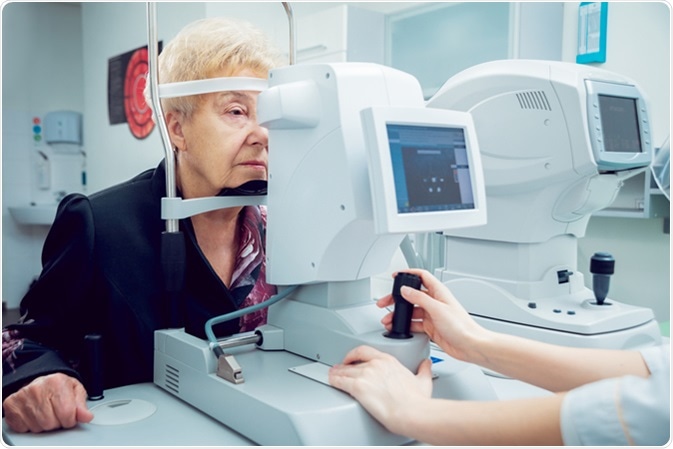Open-angle glaucoma (OAG) is an irreversible optic neuropathy characterised by peripheral visual loss that usually precedes central vision loss. Due to its chronic nature and lack of early indicators of disease progression, OAG is a major health concern worldwide.

Image Credit: Romaset / Shutterstock
How does Open-Angle Glaucoma develop?
Glaucoma, is characterised by an elevated intraocular pressure (IOP). The trabecular meshwork is a specialized region in the eye that adjusts the IOP by regulating the aqueous humor outflow from the eye. In OAG, this meshwork is blocked, and an increased resistance to the outflow of aqueous humor results. The accumulation of aqueous humor in the eye chamber increases the IOP to a level that leads to optic neuropathy.
The exact pathogenesis of optic neuropathy is not known. However, following are the two main proposed mechanisms:
- Vascular dysfunction – Which results in ischemia or an inadequate blood supply to the optic nerve
- Mechanical dysfunction - Which occurs due to the compression of the axons by the cribriform plate.
Open-Angle Glaucoma
What are the risk factors for the development of Open-Angle Glaucoma?
OAG is most common in individuals who have a previous history of elevated IOP. African-Americans, elderly persons, and those with a family history of glaucoma are more at risk. Smoking, obesity, alcohol consumption, anxiety, stress, and sleep apnea may also increase the risk of OAG.
Elevated IOP is the most readily treatable risk factor.
What are the symptoms of Open-Angle Glaucoma?
The condition is asymptomatic in the initial stages, and patients do not present with any complaints until late in the course of the disease. Vision loss from this type begins peripherally and gradually moves to the center.
Due to the silent and progressive nature of OAG, clinical evaluation is warranted in individuals at high risk.
What are the screening options for Open-Angle Glaucoma?
In asymptomatic patients younger than 40 years, screening is recommended every three to five years. However, in African Americans, persons older than 40 years, and those with multiple risk factors, screening is recommended more frequently.
Screening usually includes a complete medical history, eye examination using a gonioscope, binocular views of the optic discs, and a quantitative visual field test.
Open Angle Glaucoma - An Explanation
What is the Management of Open-Angle Glaucoma?
With timely screening and treatment, glaucoma can be identified at an early stage and its progress can be halted before the disease significantly affects vision. The main goal is to reduce IOP before the disease progresses to cause complete vision loss.
Drugs used to treat open-angle glaucoma include alpha-agonists, beta-blockers, carbonic anhydrase inhibitors, miotics, and prostaglandin analogs.
The treatment strategy usually involves taking into consideration the risk factors, adverse effects related to the drug use, the patient’s life expectancy, medical history, and concomitant conditions. Surgery is the next option in cases where IOP worsens even after administration of the maximum tolerated medical therapy.
Further Reading
Last Updated: Feb 4, 2019